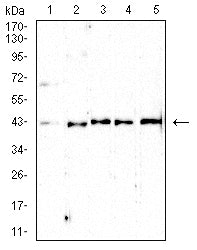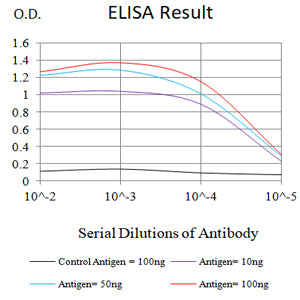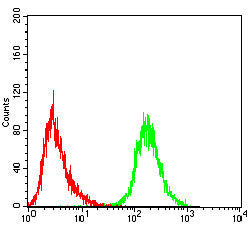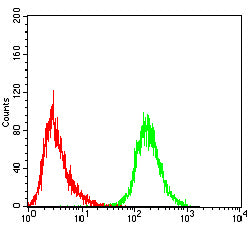



| WB | 1/500 - 1/2000 | Human,Mouse,Rat |
| IF | 咨询技术 | Human,Mouse,Rat |
| IHC | 咨询技术 | Human,Mouse,Rat |
| ICC | 技术咨询 | Human,Mouse,Rat |
| FCM | 1/200-1/400 | Human,Mouse,Rat |
| Elisa | 1/10000 | Human,Mouse,Rat |
| Aliases | T1; LEU1 |
| Entrez GeneID | 921 |
| clone | 6F5C9 |
| WB Predicted band size | 54.6kDa |
| Host/Isotype | Mouse IgG1 |
| Antibody Type | Primary antibody |
| Storage | Store at 4°C short term. Aliquot and store at -20°C long term. Avoid freeze/thaw cycles. |
| Species Reactivity | Human, Mouse |
| Immunogen | Purified recombinant fragment of human CD5 (AA: 403-495) expressed in E. Coli. |
| Formulation | Purified antibody in PBS with 0.05% sodium azide |
+ +
以下是关于CD5抗体的3篇代表性文献的简要信息:
---
1. **文献名称**: *CD5 negatively regulates T-cell receptor signaling in thymocytes*
**作者**: Axtell RC, et al.
**年份**: 2001
**摘要**: 该研究揭示了CD5作为T细胞受体(TCR)信号通路的负调节因子,通过抑制胸腺细胞中TCR介导的激活,防止过度免疫反应,为自身免疫疾病机制研究提供依据。
2. **文献名称**: *Anti-CD5 antibodies for the treatment of T-cell malignancies*
**作者**: Bergerot C, et al.
**年份**: 2018
**摘要**: 探索抗CD5 CAR-T细胞疗法在T细胞恶性肿瘤(如T细胞淋巴瘤)中的应用,通过靶向CD5抗原显著抑制肿瘤生长,为临床治疗提供新策略。
3. **文献名称**: *CD5 expression in B-cell lymphoma correlates with clinical aggressiveness*
**作者**: Visser CE, et al.
**年份**: 2001
**摘要**: 分析CD5在B细胞慢性淋巴细胞白血病(CLL)和套细胞淋巴瘤中的表达,发现其与疾病进展和不良预后相关,提示CD5可作为诊断和分期的标志物。
4. **文献名称**: *Targeting CD5 to modulate autoimmune diseases*
**作者**: Miller RA, et al.
**年份**: 1994
**摘要**: 早期研究抗CD5单抗(如人源化抗体)在类风湿性关节炎中的治疗潜力,显示其通过清除异常激活的T细胞缓解症状,推动CD5靶向疗法的开发。
---
以上文献涵盖CD5在免疫调节、肿瘤治疗及疾病诊断中的关键作用,可根据研究方向进一步查阅具体内容。
CD5 is a cell surface glycoprotein belonging to the scavenger receptor cysteine-rich (SRCR) superfamily, primarily expressed on T lymphocytes and a subset of B cells (B-1a cells). Discovered in the 1980s, it plays a regulatory role in T-cell receptor (TCR) and B-cell receptor (BCR) signaling, modulating immune activation thresholds and tolerance. CD5 interacts with ligands like CD72 and CD166. influencing lymphocyte proliferation, differentiation, and apoptosis. Its expression is retained in certain lymphoid malignancies, making it a diagnostic marker for T-cell leukemias and mantle cell lymphoma.
CD5-targeting antibodies have emerged as tools for both research and therapy. In diagnostics, anti-CD5 antibodies help identify malignant cells in tissue samples. Therapeutically, monoclonal antibodies (e.g., zolimomab aritox) have been explored to treat T-cell malignancies and autoimmune disorders by depleting pathogenic cells or blocking pro-survival signals. However, clinical success has been limited due to variable efficacy and toxicity.
Recent research focuses on bispecific antibodies, antibody-drug conjugates (ADCs), and CAR-T cells targeting CD5 to enhance specificity and reduce off-target effects. Additionally, CD5's role in immune checkpoint modulation and its paradoxical functions in promoting both immunosuppression and tumor progression remain active areas of investigation. Understanding CD5's dual roles in immunity and cancer continues to drive innovation in antibody-based therapies.
×